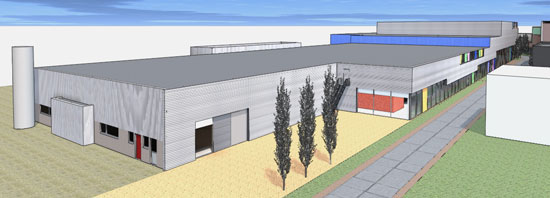 Merck Animal Health, formerly known as Intervet/Schering-Plough Animal Health, announced today that it has embarked on the expansion of a vaccine manufacturing unit at its Biosciences center Boxmeer campus in the Netherlands. The $18 million investment will result in a doubling of the capacity of its Tissue Culture Department, one of the departments where antigens for viral and parasitological vaccines are manufactured for international markets.
Merck Animal Health, formerly known as Intervet/Schering-Plough Animal Health, announced today that it has embarked on the expansion of a vaccine manufacturing unit at its Biosciences center Boxmeer campus in the Netherlands. The $18 million investment will result in a doubling of the capacity of its Tissue Culture Department, one of the departments where antigens for viral and parasitological vaccines are manufactured for international markets.
The new facility, which is scheduled to be fully operational by early 2013, has been designed to operate with optimal efficiency as well as to meet current and future requirements with respect to Good Manufacturing Practice (GMP) and Safety, Health and Environment (SHE).

It will also allow for the anticipated globally growing demand for veterinary vaccines. In addition, the increase of the manufacturing capacity that will be realized anticipates for large-scale emergency production of veterinary vaccines when extensive amounts are needed within a short time period such as during outbreaks of emerging diseases.
“Animal health is an important part of Merck’s business going forward and the company is committed to the strategic development of the animal health business. By addressing the increasing global need for high-quality, high-volume veterinary vaccine manufacturing capacity, we continue to deliver to the promise to our customers to make Merck Animal Health a best-inclass global animal health leader,” said Dr. John T. McCubbins, Senior Vice President, Animal Health Manufacturing.
Dr. Helmut Finkler, Chairman Animal Health Operations The Netherlands added: “The investment in the extension of the Tissue Culture Department here in Boxmeer is of significant importance as it demonstrates the continuous commitment of Merck towards Biosciences Center Boxmeer as a strategic site within our global Animal Health network”.

The Tissue Culture Department Boxmeer is an EU-GMP licensed facility and produces viral and parasitological antigens that are used as active components of veterinary vaccines.
The department specializes in complex biotechnological production processes that require high flexibility, using roller bottles, cell factories and other suitable cell and virus culture and purification systems. In 2010, the department produced 12 different antigens, totaling almost 300 million vaccine doses for cattle, horses, dogs, cats, fish and swine.
To address the specific regional needs for veterinary medicines, Merck Animal Health operates manufacturing sites in various countries distributed over the 5 continents. Of these, Biosciences Center Boxmeer is a global lead site in the company’s network and the animal health industry. It is the largest biotechnology site in the Netherlands. The company markets more than 350 licensed vaccines of which over 100 are manufactured in Boxmeer. The company continuously invests in its operations to accommodate growth and to ensure that it meets GMP and other standards as well as the most stringent environmental requirements.
July 20, 2011, Merck Animal Health


